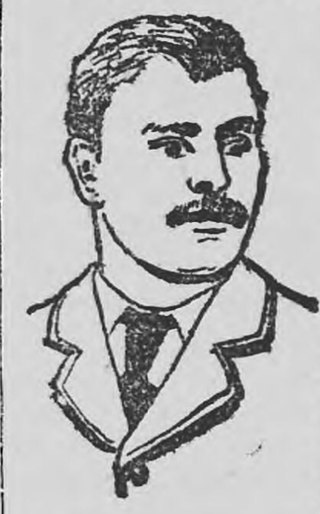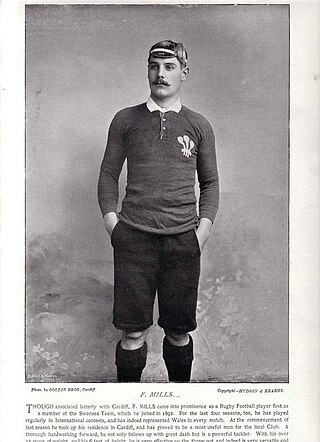
Arthur Boucher was a Welsh international rugby union forward who played club rugby for Newport. Boucher was an adaptable player, who although selected mainly as a forward, often played at centre. He was strong, quick for his position and passed well on the run. He was often noted for his kicking skills and kicked several drop goals each season even as a forward. Boucher was one of the last great all-round Welsh players before positional specialisation was adopted. Boucher played for the invitational Barbarians and became their club secretary between 1894 and 1899. He is the maternal grandfather of Dick King-Smith.

William Henry Thomas was a Welsh international rugby union player who played club rugby for Llanelli and London Welsh. He was capped eleven times for Wales and captained the team on two occasions. In 1888, Thomas was chosen to tour New Zealand and Australia as part of the first British Isles team. This unofficial tour did not play any international opposition and no caps were awarded.
Edward Perkins Alexander was a Welsh international rugby union forward who played club rugby for Cambridge University and London Welsh and international rugby for Wales. Alexander also represented several cricket teams, including Llandovery College.

Selwyn Hanam Biggs was a Welsh international rugby union fly-half who played club rugby for Cardiff and county rugby for Glamorgan. Both Biggs and his brother Norman played international rugby for Wales, though they never played in the same match for Wales together. Biggs was described at the time as a 'certain tackler' and a 'fast, good dodger'. Biggs also played cricket for Glamorgan and was part of the team to face the touring South Africans in 1895.

Wallace Howard Watts was an English-born international rugby union player who played club rugby for Newport and international rugby for Wales. Watts was part of the 1893 Wales team which won the country's first Triple Crown. From 1892 Watts played for county team Gloucestershire.

Albert Mortimer Jenkin was an English-born rugby union forward who played club rugby for Swansea, county rugby for Glamorgan and international rugby for Wales.
William Llewellyn Thomas was a Welsh international rugby union player who played club rugby for Newport, international rugby for Wales and invitational rugby for the Barbarians. He was educated at Christ College, Brecon and later while at Oxford University he achieved a sporting Blue.

Frank Matthew Mills was a Welsh rugby union forward who played club rugby for Cardiff and Swansea and won 13 caps for Wales. He is best remembered as being one of the Wales squad that won the Triple Crown for the first time in 1893.
David "Dai" Evans was a Welsh international rugby union forward who played club rugby for Penygraig and international rugby for Wales.
Samuel Ramsey was a Scottish-born rugby union forward who played club rugby for Treorchy and international rugby for Wales. Ramsey is noted as being one of the first 'Rhondda forwards', impact players selected by the Welsh Rugby Union to not only take, but also hand out physical abuse.

Clifford Alfred Bowen was a Welsh international rugby union wing who played for club rugby for Llanelli and international rugby for Wales. He was also a keen cricketer, playing for Llanelli and Carmarthenshire in the Minor Counties Cricket Championship.

Frederic Hodgson Rudd Alderson was an English international rugby union threequarter who played club rugby for Cambridge University and Hartlepool Rovers. Alderson played international rugby for England and was an original member of invitational team, the Barbarians.
Frederick Henry Cornish was an English-born rugby union forward who played club rugby for Cardiff and international rugby for Wales. Cornish 'Went North' in 1899 switching to rugby league, joining Hull FC

David Nicholl was a Welsh international rugby union forward who played club rugby for Llanelli and international rugby for Wales.

Daniel Rees was a Wales international rugby union and rugby league centre who played club rugby for Swansea and Hull Kingston Rovers. Thomas was a twice Triple Crown winner, after representing Wales during the 1900 and 1905 Home Nations Championships. Later in his career he switched to professional rugby league, joining Hull Kingston Rovers. He was described as a "speedy threequarter with a deceptive action", and would have won more than his five international caps had he not been in competition with Gwyn Nicholls for the centre position.
George Ralph Gibson was an English international rugby union forward who played club rugby for Northern. Gibson played international rugby for England and was selected to represent the British Isles on their 1899 tour of Australia. He was described by Matthew Mullineux, the British Isles captain, as a "capital worker".
Charles Alexander Hooper was an English rugby union forward who played club rugby for Cambridge University and Middlesex Wanderers and international rugby for England. In 1890 Hooper became one of the original members of the Barbarians Football Club.
William Ernest Bromet was an English rugby union forward who played club rugby for Oxford University and Tadcaster and county rugby for Yorkshire. Bromet and was a member of the first official British Isles tour in 1891 and represented England on twelve occasions between 1891 and 1896. Bromet was a part of the 1892 Triple Crown winning team for England.
William Thomas Charles Cave was an English international rugby union forward who played club rugby for Cambridge and Blackheath. Cave played international rugby for both the British Isles and England, and was also selected for invitational team the Barbarians.
William Eldon Tucker was a Bermudian rugby union player who played club rugby for Cambridge University, St. George's Hospital and Blackheath. Tucker gained his first of five international caps when he was selected for England in 1894. He returned to Bermuda after qualifying as a medical doctor.











